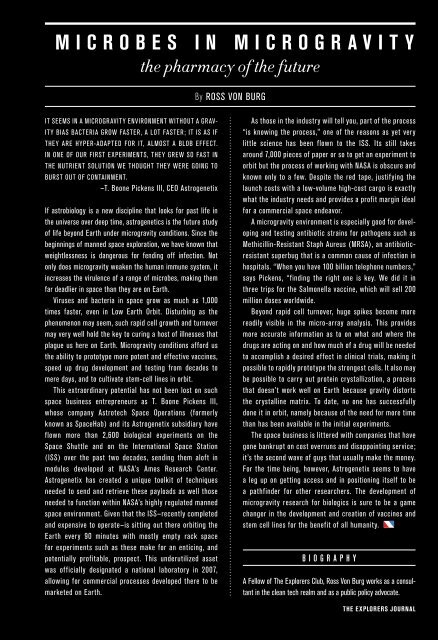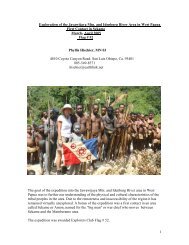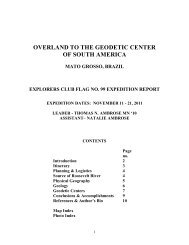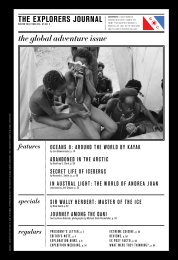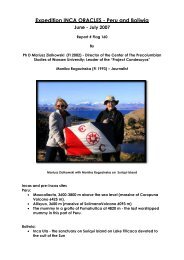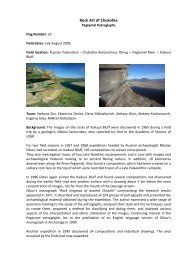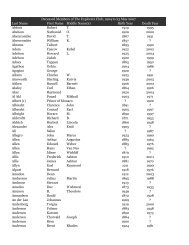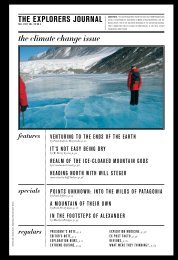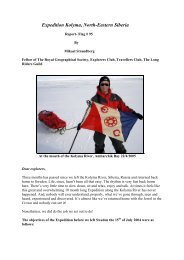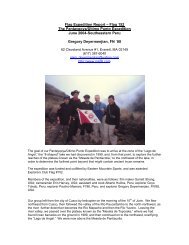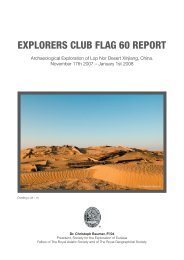the explorers journal - The Explorers Club
the explorers journal - The Explorers Club
the explorers journal - The Explorers Club
You also want an ePaper? Increase the reach of your titles
YUMPU automatically turns print PDFs into web optimized ePapers that Google loves.
M i c r o b e s i n M i c r o g r a v i t y<br />
<strong>the</strong> pharmacy of <strong>the</strong> future<br />
By Ross von Burg<br />
It seems in a microgravity environment without a gravity<br />
bias bacteria grow faster, a lot faster; it is as if<br />
<strong>the</strong>y are hyper-adapted for it, almost a blob effect.<br />
In one of our first experiments, <strong>the</strong>y grew so fast in<br />
<strong>the</strong> nutrient solution we thought <strong>the</strong>y were going to<br />
burst out of containment.<br />
—T. Boone Pickens III, CEO Astrogenetix<br />
If astrobiology is a new discipline that looks for past life in<br />
<strong>the</strong> universe over deep time, astrogenetics is <strong>the</strong> future study<br />
of life beyond Earth under microgravity conditions. Since <strong>the</strong><br />
beginnings of manned space exploration, we have known that<br />
weightlessness is dangerous for fending off infection. Not<br />
only does microgravity weaken <strong>the</strong> human immune system, it<br />
increases <strong>the</strong> virulence of a range of microbes, making <strong>the</strong>m<br />
far deadlier in space than <strong>the</strong>y are on Earth.<br />
Viruses and bacteria in space grow as much as 1,000<br />
times faster, even in Low Earth Orbit. Disturbing as <strong>the</strong><br />
phenomenon may seem, such rapid cell growth and turnover<br />
may very well hold <strong>the</strong> key to curing a host of illnesses that<br />
plague us here on Earth. Microgravity conditions afford us<br />
<strong>the</strong> ability to prototype more potent and effective vaccines,<br />
speed up drug development and testing from decades to<br />
mere days, and to cultivate stem-cell lines in orbit.<br />
This extraordinary potential has not been lost on such<br />
space business entrepreneurs as T. Boone Pickens III,<br />
whose company Astrotech Space Operations (formerly<br />
known as SpaceHab) and its Astrogenetix subsidiary have<br />
flown more than 2,600 biological experiments on <strong>the</strong><br />
Space Shuttle and on <strong>the</strong> International Space Station<br />
(ISS) over <strong>the</strong> past two decades, sending <strong>the</strong>m aloft in<br />
modules developed at NASA’s Ames Research Center.<br />
Astrogenetix has created a unique toolkit of techniques<br />
needed to send and retrieve <strong>the</strong>se payloads as well those<br />
needed to function within NASA’s highly regulated manned<br />
space environment. Given that <strong>the</strong> ISS—recently completed<br />
and expensive to operate—is sitting out <strong>the</strong>re orbiting <strong>the</strong><br />
Earth every 90 minutes with mostly empty rack space<br />
for experiments such as <strong>the</strong>se make for an enticing, and<br />
potentially profitable, prospect. This underutilized asset<br />
was officially designated a national laboratory in 2007,<br />
allowing for commercial processes developed <strong>the</strong>re to be<br />
marketed on Earth.<br />
As those in <strong>the</strong> industry will tell you, part of <strong>the</strong> process<br />
“is knowing <strong>the</strong> process,” one of <strong>the</strong> reasons as yet very<br />
little science has been flown to <strong>the</strong> ISS. Its still takes<br />
around 7,000 pieces of paper or so to get an experiment to<br />
orbit but <strong>the</strong> process of working with NASA is obscure and<br />
known only to a few. Despite <strong>the</strong> red tape, justifying <strong>the</strong><br />
launch costs with a low-volume high-cost cargo is exactly<br />
what <strong>the</strong> industry needs and provides a profit margin ideal<br />
for a commercial space endeavor.<br />
A microgravity environment is especially good for developing<br />
and testing antibiotic strains for pathogens such as<br />
Methicillin-Resistant Staph Aureus (MRSA), an antibioticresistant<br />
superbug that is a common cause of infection in<br />
hospitals. “When you have 100 billion telephone numbers,”<br />
says Pickens, “finding <strong>the</strong> right one is key. We did it in<br />
three trips for <strong>the</strong> Salmonella vaccine, which will sell 200<br />
million doses worldwide.<br />
Beyond rapid cell turnover, huge spikes become more<br />
readily visible in <strong>the</strong> micro-array analysis. This provides<br />
more accurate information as to on what and where <strong>the</strong><br />
drugs are acting on and how much of a drug will be needed<br />
to accomplish a desired effect in clinical trials, making it<br />
possible to rapidly prototype <strong>the</strong> strongest cells. It also may<br />
be possible to carry out protein crystallization, a process<br />
that doesn’t work well on Earth because gravity distorts<br />
<strong>the</strong> crystalline matrix. To date, no one has successfully<br />
done it in orbit, namely because of <strong>the</strong> need for more time<br />
than has been available in <strong>the</strong> initial experiments.<br />
<strong>The</strong> space business is littered with companies that have<br />
gone bankrupt on cost overruns and disappointing service;<br />
it’s <strong>the</strong> second wave of guys that usually make <strong>the</strong> money.<br />
For <strong>the</strong> time being, however, Astrogenetix seems to have<br />
a leg up on getting access and in positioning itself to be<br />
a pathfinder for o<strong>the</strong>r researchers. <strong>The</strong> development of<br />
microgravity research for biologics is sure to be a game<br />
changer in <strong>the</strong> development and creation of vaccines and<br />
stem cell lines for <strong>the</strong> benefit of all humanity.<br />
b i o g r a p h y<br />
A Fellow of <strong>The</strong> <strong>Explorers</strong> <strong>Club</strong>, Ross Von Burg works as a consultant<br />
in <strong>the</strong> clean tech realm and as a public policy advocate.<br />
<strong>the</strong> <strong>explorers</strong> <strong>journal</strong>


